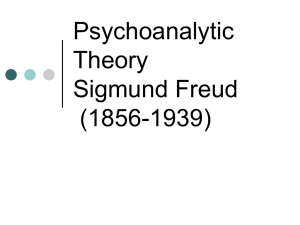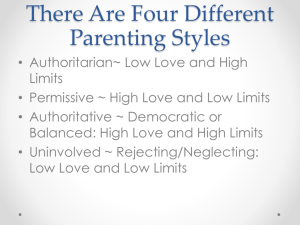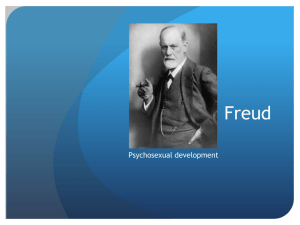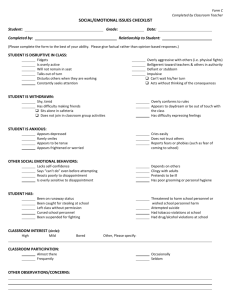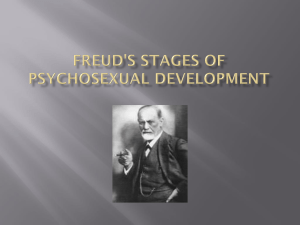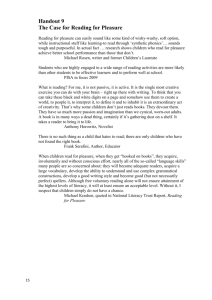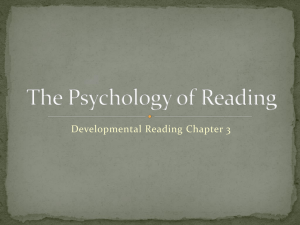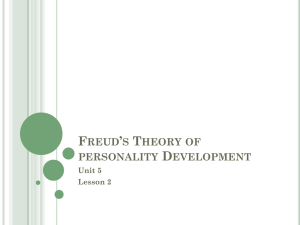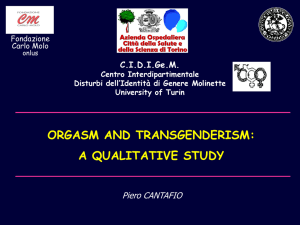Freud`s Psychosexual Stages of Development
advertisement
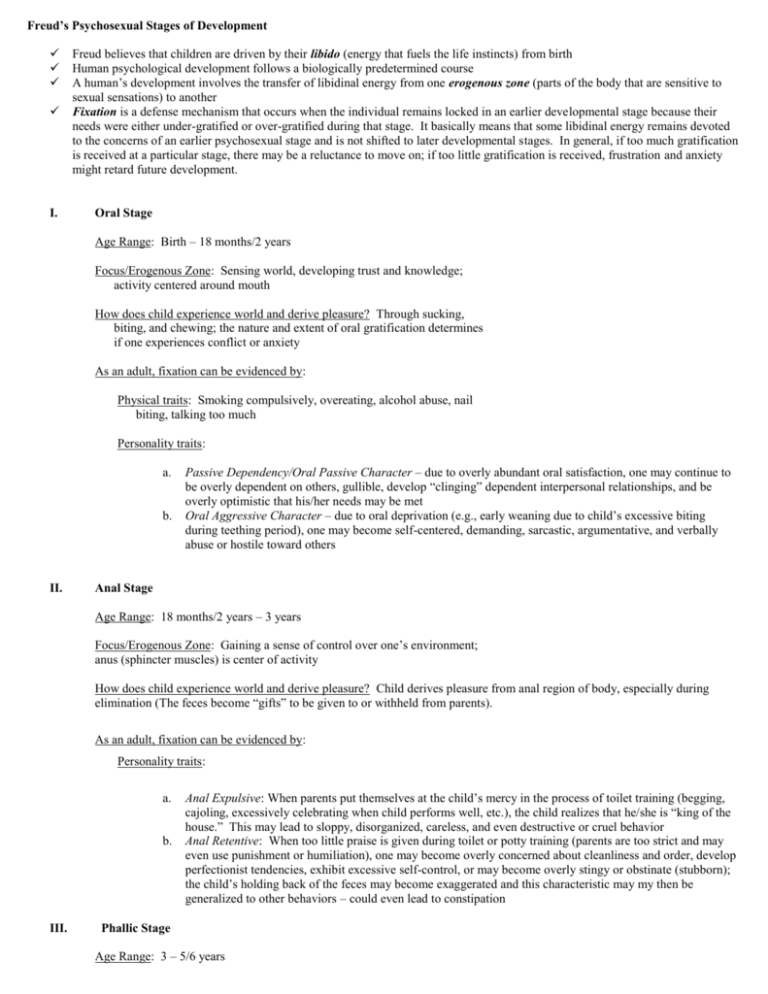
Freud’s Psychosexual Stages of Development I. Freud believes that children are driven by their libido (energy that fuels the life instincts) from birth Human psychological development follows a biologically predetermined course A human’s development involves the transfer of libidinal energy from one erogenous zone (parts of the body that are sensitive to sexual sensations) to another Fixation is a defense mechanism that occurs when the individual remains locked in an earlier developmental stage because their needs were either under-gratified or over-gratified during that stage. It basically means that some libidinal energy remains devoted to the concerns of an earlier psychosexual stage and is not shifted to later developmental stages. In general, if too much gratification is received at a particular stage, there may be a reluctance to move on; if too little gratification is received, frustration and anxiety might retard future development. Oral Stage Age Range: Birth – 18 months/2 years Focus/Erogenous Zone: Sensing world, developing trust and knowledge; activity centered around mouth How does child experience world and derive pleasure? Through sucking, biting, and chewing; the nature and extent of oral gratification determines if one experiences conflict or anxiety As an adult, fixation can be evidenced by: Physical traits: Smoking compulsively, overeating, alcohol abuse, nail biting, talking too much Personality traits: a. b. II. Passive Dependency/Oral Passive Character – due to overly abundant oral satisfaction, one may continue to be overly dependent on others, gullible, develop “clinging” dependent interpersonal relationships, and be overly optimistic that his/her needs may be met Oral Aggressive Character – due to oral deprivation (e.g., early weaning due to child’s excessive biting during teething period), one may become self-centered, demanding, sarcastic, argumentative, and verbally abuse or hostile toward others Anal Stage Age Range: 18 months/2 years – 3 years Focus/Erogenous Zone: Gaining a sense of control over one’s environment; anus (sphincter muscles) is center of activity How does child experience world and derive pleasure? Child derives pleasure from anal region of body, especially during elimination (The feces become “gifts” to be given to or withheld from parents). As an adult, fixation can be evidenced by: Personality traits: a. b. III. Anal Expulsive: When parents put themselves at the child’s mercy in the process of toilet training (begging, cajoling, excessively celebrating when child performs well, etc.), the child realizes that he/she is “king of the house.” This may lead to sloppy, disorganized, careless, and even destructive or cruel behavior Anal Retentive: When too little praise is given during toilet or potty training (parents are too strict and may even use punishment or humiliation), one may become overly concerned about cleanliness and order, develop perfectionist tendencies, exhibit excessive self-control, or may become overly stingy or obstinate (stubborn); the child’s holding back of the feces may become exaggerated and this characteristic may my then be generalized to other behaviors – could even lead to constipation Phallic Stage Age Range: 3 – 5/6 years Focus/Erogenous Zone: Resolution of gender-specific complex; self-identity and social identity (identification process) genitals (one’s own) become the center of attention How does child experience world and derive pleasure? Child derives pleasure through masturbatory activities and accompanying fantasies As an adult, fixation can be evidenced by: Personality traits: IV. a. If a child is made to feel shame and guilt about masturbation and sexual fantasies, insecurity and anxiety can develop; as an adult, the person might be overly aggressive, with tendencies to “show off” and brag as a cover-up for underlying, unresolved self-doubts and anxiety b. Being uncomfortable with one’s own sexuality, rigid, and needing to prove oneself may result from fixation at this stage c. If the boy is harshly rejected by his mother, and rather threatened by his very masculine father, he is likely to have a poor sense of self-worth when it comes to his sexuality. He may deal with this by either withdrawing from heterosexual interaction, perhaps becoming a “book worm,” or by putting on a rather macho act and playing the ladies’ man; a girl rejected by her father and threatened by her very feminine mother is also likely to feel poor about herself, and may become a wall-flower or a hyper-feminine “belle.” d. If a boy is favored by mom over his “weak,” bland father, he may develop quite an opinion of himself (which may suffer greatly later because nobody loves him like his mother did) and may appear rather effeminate (he has no cause to identify with father); if a girl is daddy’s “little princess” and best buddy, and mommy has been relegated to a sort of servant role, she may become quite vain and self-centered, or possibly rather masculine. Latency Stage Age Range: 5/6 years – puberty (**Note: strictly speaking, this is not a psychosexual stage as it is devoid of heavy sexual content) Focus: No erogenous zone is center of attention for incestuous and aggressive impulses of the Oedipus Complex have been partially repressed, partially converted into acceptable feelings, or partially resolved through the process of identification; child develops social and intellectual skills How does child experience world and derive pleasure? Through redirecting energy into emotionally safe and socially acceptable activities (sublimation), child forgets highly stressful conflicts of the phallic stage; characterized by play with same-sex peers and feelings of affection and tenderness toward parents V. Genital Stage Age Range: Begins at puberty Focus/Erogenous Zone: While pre-genital stages are characterized by selfcentered gratification seeking, focus turns to heterosexual relationships involving mutual gratification (outside of family); a reawakening of genital sexuality How does child experience world and derive pleasure? Through experimenting with loving, intimate relationships that are mutually gratifying Freud’s Legacy: 1. 2. 3. 4. 5. Personality development is determined in the first 5-6 years, in our culture’s view. Childhood is the most important stage of psychological development. Before Freud, virtually no scientific attention was devoted to human affection systems, such as attachment and dependency (particularly in childhood) – an emphasis on developmental psychology A pioneer in establishing the role of sexuality as an important factor in psychological development The importance of unconscious processes (thoughts, impulses, conflicts) His theory raised the importance of “motherhood” and parenting in general
